The five best places to see Boston's African American culture and history

From Nubian Markets to the National Center for Afro-American Artists, a local tour guide offers his picks for the best places to see Boston's Black culture
Boston is a city of neighbourhoods, and if you wander off the 2.5-mile Freedom Trail that passes through 16 significant sites in US history, you'll find extraordinary stories tucked in every nook and corner. Getting visitors to explore the city's varied cultural districts has long been a goal of Collin Knight, who founded Live Like a Local Tours in 2019. As a native of Roxbury, the neighbourhood that's the beating heart of Boston's Black community, he's working to highlight the city's rich African American culture while also acknowledging Boston's history of racial tensions.
Though Boston is perhaps most famous for its strong Irish roots, the city's Black history runs deep. Prior to the US Civil War, Boston was one of the most important stops on the Underground Railroad. The first chartered branch of the National Association for the Advancement of Colored People civil rights organisation was founded here in 1911. Malcolm X moved to Boston 30 years later, followed by Dr Martin Luther King Jr, who considered the city his "second home" and fell in love with his would-be wife, Coretta Scott King, here. Today, 25 percent of Boston's population is Black – twice the percentage of the Black population in the US.
"When we look at downtown, the city's Eurocentric history is being glorified each and every day. They're not really talking about Native Americans and African Americans and their plight within this country and Boston's connection to slavery," Knight says. "I'm trying to figure out how we can tell the whole history of Massachusetts in the city of Boston instead of just telling one part."
Here are Knight's suggestions of the five best places in Boston to experience the city's vibrant modern-day Black culture, as well as the ties to its past.
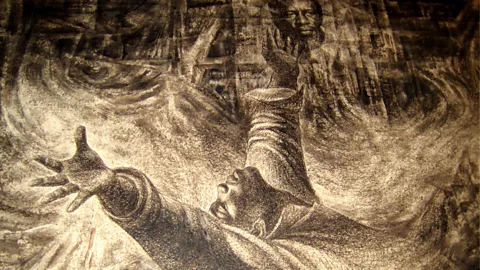 NCAAA
NCAAA1. The National Center for Afro-American Artists
"The National Center for Afro-American Artists (NCAAA) houses art from some of the most prominent African American artists that have lived in the Boston area or are from the Boston area. A lot of people don't know much about it," Knight says. "Dr Barry Gaither has been the curator of that museum since 1968. It was created by Dr Elma Lewis, who was the grande dame of the arts within the Boston area for many years. She was very well known for providing arts and culture to young people of colour within Boston, and Roxbury specifically."
Knight's must-see experiences within the museum include seeing the narrative paintings of Roxbury legend Allan Crite, known as the "Dean of African American artists" in New England, thanks to his nearly 90-year career. Another highlight, says Knight, is the ASPELTA exhibit displaying artefacts from Nubia. The exhibit features scores of 2,600-year-old objects recovered by archaeologists from Boston's Museum of Fine Arts and Harvard University, including a fully-accurate recreation of the interior of a Nubian tomb. "It's pretty incredible," Knight says.
Website: https://ncaaa.org/
Address: 300 Walnut Street, Roxbury
Phone: 1-617-442-8614
Facebook:@themuseum_ncaaa
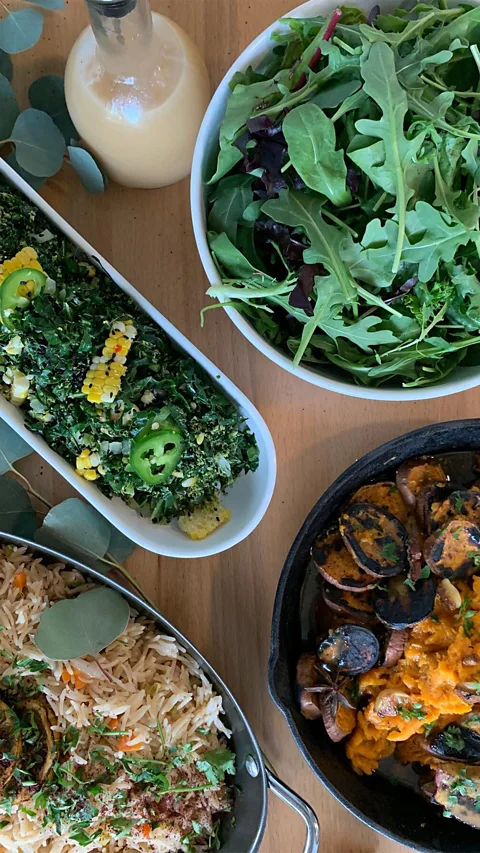 Nubian Markets
Nubian Markets2. Nubian Markets
This sprawling new grocery store, halal butcher shop and fast-casual cafe, which opened in Roxbury in spring 2023, celebrates the food of the African diaspora. Its shelves are stocked with hard-to-find produce and vegetable items, and more than 30 Black-owned brands. "It's absolutely incredible when you think about it: the halal approach, the restaurant/supermarket approach and the fact that it's a Black-owned supermarket in the middle of Roxbury," Knight says, noting that, historically, most grocery stores in the neighbourhood had been white-owned or run by white conglomerates.
"This is a very powerful thing for us as Black people," Knight added. "It's not something that we've ever had in our own community… They are focused on supporting other local businesses and other vendors of colour across the country."
Cuts of lamb, beef, and goat sold at the shop are raised following Islamic standards to feed the city’s growing Muslim population, and many products on its shelves, sauces and spice mixes, are produced by local artisans like Cameroon native Paulette Ngachoko, founder of Hapi African Gourmet. In the cafe, menu items range from ginger beef and injera bowls to pea fritters and lamb couscous. "I'm just excited about everything they're doing," Knight says.
Website: https://www.nubianmarkets.com/
Address: 2565 Washington Street, Roxbury
Phone: 1-617-608-4940
Instagram: @nubianmarkets
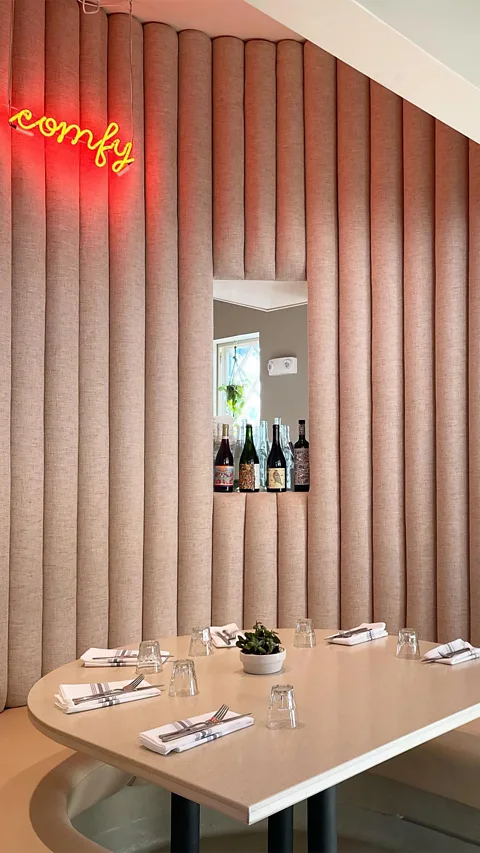 Comfort Kitchen
Comfort Kitchen3. Comfort Kitchen
This cosy Black-, immigrant- and woman-owned restaurant opened in January 2023 in Dorchester's Uphams Corner neighbourhood. It was nearly a decade in the making and comes with its own dose of history: it's housed inside a 1912-built building that is on the National Register of Historic Places.
"I love the owners over there. You think about the vibe that's in there, you think about the menu and how it's connected to the African diaspora," Knight says. "[The building] was a comfort station [public restroom] for people travelling from the Dorchester area to the South Shore."
Inside the former bathroom, the chic 30-seat space has curved pale-pink banquettes that are an Instagram favourite. Cocktails feature Equiano, an Afro-Caribbean rum produced in Mauritius and Barbados, or pay tribute to Black engineering pioneer Lewis Latimer, who worked alongside Alexander Graham Bell to develop the telephone in Boston in the 1880s. (Non-alcoholic drinks include a take on Tootsie, a Ghanaian fermented beer or a baobab mocktail.) For dinner, munch on jackfruit sliders, jerk roasted duck or za'atar brown butter trout.
Website: https://www.comfortkitchenbos.com/
Address: 611 Columbia Road, Dorchester
Phone: 1-617-329-6010
Instagram: @comfortkitchenbos
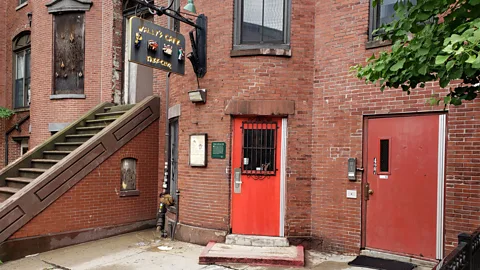 Wally's Cafe and Jazz Club
Wally's Cafe and Jazz Club4. Wally's Cafe and Jazz Club
Wally's is an institution in Boston's South End neighbourhood, and when founder Joseph Walcott opened the club in 1947, he was the first African American nightclub owner in New England. Walcott got his start by drawing – and often driving – musicians up from New York City and created one of the few spaces in Boston during the time of segregation where anyone of any race could mingle. Today his grandchildren run the space, which hosts music 365 nights a year, often drawing from talented students at Berklee School of Music, the New England Conservatory and other nearby institutions. It's considered the oldest jazz club in the city.
"What most people don't realise is there were jazz joints and juke joints up and down Massachusetts Avenue. That is the last of a dying breed that we had all over [the area] back in the day. All of the greats came to play," says Knight – among them Duke Ellington, Charlie Parker and Billie Holiday. Check the schedule for their funk, jazz, and salsa offerings, which run from 17:00 to 01:00 nightly.
Website: https://wallyscafe.com/
Address: 427 Massachusetts Ave., South End
Phone: 1-617-828-1754
Instagram: @wallyscafejazzclub
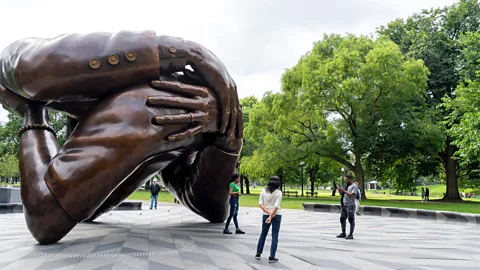
5. The Embrace
This new, massive bronze sculpture was unveiled on Boston Common this year, celebrating Boston's civil rights legacy and commemorating the period that Dr Martin Luther King Jr lived in Boston. King attended theology school at Boston University in the 1950s and met his wife, Coretta Scott King, who was attending the New England Conservatory of Music, while living in the city.
The sculpture, by artist Hank Willis Thomas, is an abstract depiction based on a photo of the couple embracing after King won the Nobel Peace Prize in 1964. It also recognises a moment in April 1965 when the leader stood on the park before a crowd of 22,000 and called for Boston to live up to its ideals and create a more equitable city.
While the sculpture alone "is a really beautiful piece to tell that history, I think, more importantly, if you look at the grounds of The Embrace, you see all of these names [of people who marched alongside King and helped expand his ideas]," Knight says. "It's really about all of the local community advocates that have made a difference within the Roxbury community and the Boston community at large. So, I think it's an incredible tribute to Dr Martin Luther King and Coretta Scott King, but it's also a tribute to our city as a whole, to talk about the Black histories of our city, of our neighbourhoods, and have it be in the middle of the Boston Common."
Website: https://www.embraceboston.org/memorial
Address: Boston Common, 139 Tremont Street
Instagram: @embracebos
This article was originally published on 17 June 2023 and has been updated, including the removal of one business which has since closed, Soleil restaurant.
---
If you liked this story, sign up for the weekly bbc.com features newsletter called "The Essential List". A handpicked selection of stories from BBC Future, Culture, Worklife and Travel, delivered to your inbox every Friday.
